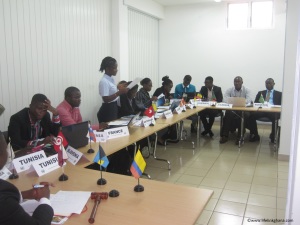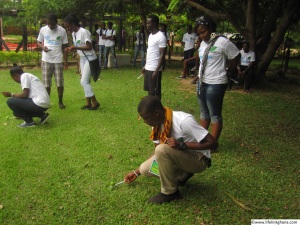Being a member of a Model UN Dais (Chair, Director or Rapporteur) could be one of the most fulfilling experiences for a Model UN delegate. It is an opportunity to lead and succeed, and it requires that you know what your delegates are thinking. Here, I share five of the key lessons I learned from delegates during my times as a member of a Model UN dais.
1. They are nervous about their participation
In many conferences especially those involving middle school and high school students, delegates are anxious. For most conferences such delegates are willing to ask many questions, no matter how trivial, prior to the conference; from grammar to conference clothing. I have had to personally answer questions about what delegates had to eat before coming to a conference. These are signs of delegates’ anxiety and the dais could help them a lot by giving them a heart-warming, welcoming gesture or light-hearted comment that settles them at the conference registration desk and also before committee proceedings begin.
2. Your attitude on the first day determines their attitude on the subsequent
Delegates pick their approach to proceedings from how they interpret the dais’ handling of affairs. For delegates at the middle school and high school levels, they could take a reserved stance in-committee if they realize the dais is interested in keeping an iron fist on proceedings. I have personally learned to initially loosen up a bit on the rules of procedure just to accommodate first timers and those who may not be so confident about the rules of procedure. For high school and basic school delegates, a closed conference room is intimidating enough and they rely on the dais’ demeanor to get them to be active or passive. A strict demeanor of the dais may have an opposite effect on college level delegates. Your delegates will scheme to rebel and unnecessarily complicate issues for you in committee when they feel you are too hard on the process. My observation is that being too strict on the rules of procedure is as bad as being too lax on it. However, since delegates involvement in conferences starts on a slow pace and picks up as the days go by, the dais (especially the chair) could adopt a flexible stance on the preliminary days of conference and increase their level of adherence as the days go by. This is especially helpful for new delegates.
3. Give them enough time to speak
Model UN is a learning platform. Many delegates have taken pains to prepare their statements and key points for discussion. It is true that speaking time is determined by committee but the dais should me accommodating and flexible enough to shape the time allowed for verbal expression. Many delegates I have led complained that the formal debates (moderated caucuses) are too methodical and do not allow for easy and quick expression. They find the informal sessions (un-moderated caucuses) to be more delegate friendly. Delegates have expressed that they understood the MUN process better from the informal sessions. So maybe your delegates will enjoy your committee better if you allow them more time for un-moderated caucus.
4. Some of them don’t write their papers themselves (maybe then don’t wish you knew)
This should probably be a heads-up to chairs/directors who have not yet noticed it. Some delegates find the position papers or resolution writing very challenging and would rather get someone do the writing for them; especially when they wish to win awards at any cost. So directors, pay attention to detail and connect that to the level of the conference. There is a reasonable level of expression that you would expect from a middle school or high school student. I have met middle school delegates confess that their mum or elderly brother wrote their position papers for them. One of the important lessons that Model UN teaches students in Ghana is the ability to write independently and persuasively. That is why it is important that the committee directors deter proxy writing and go the extra mile to know which papers were written by Model UN delegate or ‘their delegates’.
5. Stick to time: The non-formal events are important to them as the formal sessions
As officials, we sometimes get carried away by the beauty of debate during proceedings. Nothing annoys delegates more than when they realize they have to skip an evening comedy program due to lost time from committee sessions. In many of the conferences that I have supervised, the post conference evaluations have recorded comments about time management in committees and the responses that delegates give indicate their strong in how committee time is managed. Making time off formal sessions for non-formal activities on the program makes their conference whole…and they want you (members of the dais) to get involved in the fun when the time comes.





